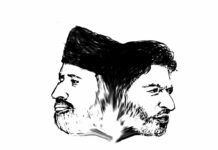Riyaz Masroor
Chief of Kashmir’s frontline resistance group JKLF, Muhammad Yasin Malik’s angry outburst against Hurriyat Conference (Umar group) points to the worst ever policy trauma among moderate separatists.
Malik has accused Mirwaiz group of serving Indian interests and also swindling money meant for the victims of war in Kashmir. The allegation was starkly disproportionate to the context in which it was leveled.
Anjuman-e-Sharie-Shiyan (ASS), a Hurriyat (M) constituent had organized a seminar at University of Kashmir where Mirwaiz Umar Farooq and Malik were slated to speak. But Mirwaiz comprised the panel of speakers while Yasin was denied the opportunity to speak. The hosts cited paucity of time as reason. Malik, who like Mirwaiz had been to various Universities in U.S and Europe, spewed anger in wildly accusatory tone. What made matters worse was the counter allegations by ASS against Malik.
This ‘war of headlines’ can be viewed as a symptom of policy crisis within Kashmiri moderate separatists. Had it not been so, a trivial issue would not have led to a public spat.
People hold the right to ask ASS that if it knew Malik’s movement was throughout “domineering, motivated and self-driven”, why did it maintain a ‘warm friendship’ with him , as admitted by the group in its press release on June 4,2013.
Malik too owes an explanation as to why he did not ‘spill the beans’ if he knew that somebody was hurting the resistance movement. The allegations that flew from both sides lose steam in this backdrop. One must not read too much into them, as they would server none but the adversaries of both. Yet they lay bare a deep seated ideological tension within separatist ranks.
Shabir Shah’s virtual rebellion against his Chairman Mirwaiz Umar more vividly illustrates this problem. He has recalled his representative from Hurriyat’s Pakistan chapter and Mirwaiz has confirmed that Shah has almost spurned him by not attending meetings and running parallel campaigns.
Professor Abdul Gani and Moulana Abbass Ansari are confined to special appearances during seminars.
While pro-dialogue shades of Kashmiri separatism undergo ideological attrition, New Delhi seems least bothered about reviving the dialogue with separatists.
Masarat Alam, is still in jail for orchestrating the 2010 protest campaigns. Qasim Faktoo may surpass Nelson Mandela in serving the longest ever jail term. Hundreds of thousands of youth are increasingly feeling let down and many educated youth have resorted to armed resistance. Geelani continues to address funerals of militants who die while fighting Indian forces. This scenario is a loud rejoinder to the soft separatism which the moderates had paddled before 2008.
Challenge to the moderates’ realism politics initially came from the frail old man, Syed Ali Geelani who appears to have caused a sort of moral isolation from his colleagues. A decade ago, they parted ways with him, embracing a ‘compromise formula’ thrown up by Pakistan’s then military ruler General Parvez Musharaf. Despite his unflinching desire to merge Kashmir with Pakistan, Geelani, stayed away from Musharraf’s 4-point bogey and fell out of Islamabad’s favor.
His rigid, repetitive discourse around the presence of Indian armed forces in Kashmir and outright rejection of any bilateral dialogue with New Delhi sounded absurd when Musharraf was in power. Now, the ‘Geelanism’ seems to have obscured the much-hyped rounds of dialogue held in recent years between moderate separatists and Indian government. Interestingly, major part of credit for Geelani’s psychological victory goes to New Delhi.
Malik, who held dialogue with Prime Minister Manmohan Singh soon after his marathon ‘freedom march’ across Kashmir, recently, read out the obituary of the dialogue process.
He accused Manmohan Singh of ‘killing the dialogue’ and called for a complete shutdown to protest the slated arrival of Prime Minister on June 25.
Experience not rhetoric should guide the political policy of those who want to effect change through democratic means. When Geelani opposed the dialogue and elections, he was speaking as an experienced three-time MLA and as a witness to many sterile rounds of Indo-Pak, Delhi-Srinagar talks.
But the moderates were eager to pick up the gauntlet New Delhi had thrown in. They too held talks with BJP and Congress-led governments. Now the separatist polity seems to have come full circle because moderates too are as ‘experienced’ as Geelani. A unity of sorts is in the air lest the egotist leaders fail to read the writing on the wall.
(Author is Srinagar-based Journalist email: [email protected])
















Alamdar said:sarie samhav aksie .Razi lamhav ad ma ravha kahan gav. So be united . Union is strength